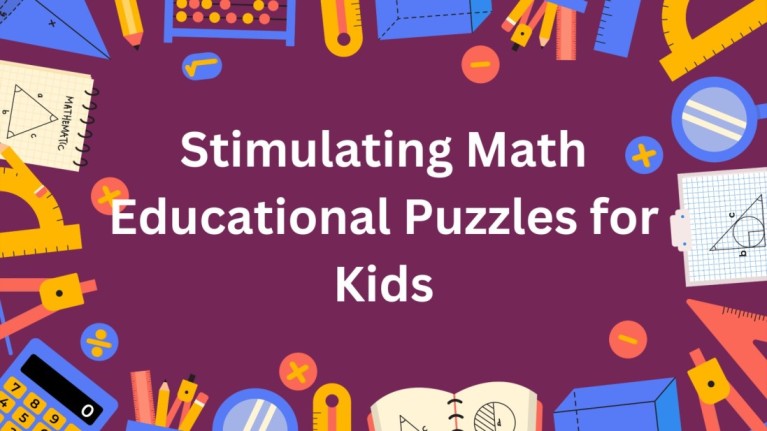Top 4 Stimulating Math Educational Puzzles for Kids: Enhance Critical Thinking & Problem-Solving Skills
Math can often seem like a daunting subject for children, filled with complex concepts and challenging problems. However, it doesn’t have to be a source of stress or boredom. In fact, math can be both enjoyable and enlightening when approached through interactive and engaging methods. One of the most effective ways to make math learning fun and rewarding is by introducing children to math educational puzzles.
Math puzzles are a fantastic tool for transforming the learning process into an exciting adventure. They capture children’s attention by presenting mathematical problems in a playful and stimulating format. These puzzles not only make learning enjoyable but also foster essential skills such as critical thinking, problem-solving, and logical reasoning. By tackling puzzles, kids can develop a deeper understanding of mathematical concepts while enjoying a sense of accomplishment as they solve each challenge.
In this blog, we will delve into a diverse array of math educational puzzles designed specifically for children. We’ll explore various types of puzzles that cater to different age groups and skill levels, providing a comprehensive overview of how each can enhance a child’s mathematical abilities. Additionally, we’ll offer practical tips on how to integrate these puzzles into your child’s learning routine to maximize their educational benefits. From brain-teasing riddles and logic games to engaging number challenges and interactive problem-solving activities, these puzzles are crafted to make math a subject that kids look forward to exploring.
Join us as we uncover the world of math educational puzzles and discover how they can turn math learning into an enjoyable and enriching experience for your child.
Why Math Educational Puzzles?
Math educational puzzles offer a unique approach to learning by combining fun with education. Here are a few reasons why they are beneficial:
- Engagement: Puzzles are inherently engaging, keeping kids focused on solving problems.
- Critical Thinking: Math puzzles require logical reasoning, an essential life skill.
- Confidence Building: Solving puzzles boosts confidence in math abilities, encouraging kids to take on more challenges.
- Persistence: Puzzles teach kids patience and persistence, vital for problem-solving.
Types of Math Educational Puzzles for Kids
1. Number Puzzles for Kids
Number puzzles are a great way to introduce basic math concepts like addition, subtraction, multiplication, and division.
- Sudoku for Kids: A classic number puzzle that teaches logical thinking. Start with smaller grids for younger kids and gradually move to more complex ones.
- Magic Squares: A number puzzle where kids fill a grid with numbers so that the sums of each row, column, and diagonal are the same.
2. Pattern Recognition Puzzles
Pattern recognition puzzles are crucial for helping kids understand sequences and relationships between numbers.
- Shape Patterns: Kids identify the next shape in a sequence based on the pattern.
- Number Sequences: Puzzles where kids determine the next number in a sequence, helping with math educational development.
3. Geometry Puzzles for Kids
Geometry puzzles help kids understand shapes, sizes, and spatial relationships.
- Tangrams: An ancient puzzle that involves arranging seven flat shapes to form various figures, enhancing spatial awareness.
- Symmetry Puzzles: Puzzles where kids create or complete symmetrical shapes, helping them understand balance and proportion.
4. Word Problems 
Word problems are story-based puzzles that apply math knowledge to real-life scenarios.
- Treasure Hunts: A math puzzle where kids solve problems to find clues leading to a treasure.
- Daily Life Scenarios: Scenarios like shopping or cooking where kids calculate costs or quantities, making math practical and useful.
Tips for Parents and Educators on Using Math Educational Puzzles
- Start Simple: Begin with easy math educational puzzles and increase the difficulty as kids gain confidence.
- Incorporate Fun: Use colorful visuals, interesting themes, and relatable contexts to make puzzles more engaging.
- Encourage Collaboration: Let kids work together on puzzles to foster teamwork and collective learning.
- Celebrate Success: Always celebrate when a child solves a puzzle to keep them motivated.
Conclusion
Math educational puzzles for kids are an excellent way to make math fun and less intimidating. By integrating these puzzles into daily learning, parents and educators can help children develop a love for math, along with essential problem-solving and critical-thinking skills. Whether through number games, geometry challenges, or pattern recognition exercises, the key is to keep the experience enjoyable and rewarding.
Transform math from a daunting task into an exciting adventure with the magic of math educational puzzles! Also visit interactive math activity for kids if you are looking for more creativity and fun. Plus for printable sheets visit Printable Math Puzzles.

